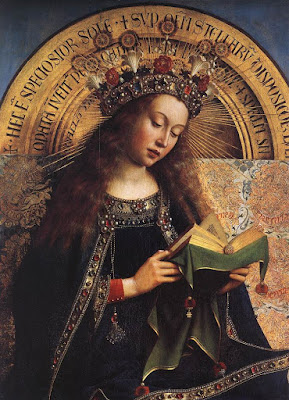An inspiring excerpt from Solange Hertz's Searcher of Majesty:
Ancient monks called Mary "the philosophy of Christians," and spoke of "philosophari in Maria." Obviously philosophy belongs to the housewife as tent-making belongs to St. Paul. It's comprehensive. It's cheap. It requires absolutely no special equipment but wonder. One has to study philosophy and invest in expensive books to be a philosophy professor, but not to be a philosopher. A philosopher is just anyone who's willing to hit head on, with his head, the mystery in what everybody else takes for granted.
Really only housewives have time to grapple in their native habitat with such things as space, time, being, motion, birth, or growth, in order to classify properly why dishes break, or why yesterday can't be lived again, what's up, or just who is my five-year-old. Whatever the housewife chooses to study at home, she is in the enviable position of being able to go after knowledge itself, without the encumbrance of degrees. This isn't an inconsiderable advantage, being set free to proceed at her own rate, without grades or classroom, toward what she, and not somebody else, needs to know.Here I would like to insert that later in the book, Mrs. Hertz talks about women and the cyclical nature of their hormones, which explains their need for stable lives at home, and how our culture demands instead that they run hither and yon. (I wonder what Mrs. Hertz would have to say about American women now fighting in wars!) She compares this to how dairy cows are treated, which may seem funny, but it is so true. Dairy cows lead quiet lives of regularity at home, because if they can't their milk dries up. This is true of women too, whether it's producing milk for the baby or the milk of human kindness or sharing "the milk" of their wisdom. I have come in contact with so many young women whose health has collapsed because of how the unnatural stress of college affects their hormones.
Mrs. Hertz continues:
A mother's knowledge can't be just a series of isolated facts to be tabulated later, like a research assistant's. It must be coordinated and unified even beyond the power of philosophy to accomplish. It must be super naturalized. It must become wisdom. Wisdom can take unto herself any amount of undigested facts and transfigure them, but in this world this happens only through suffering, through pondering them painfully and deeply in the heart.
Few mothers can take it. Their college educations rarely become a part of them to that extent. Ignorant women are the curse of the home, as great female educators like St. Madeline Sophie Barat and Mother Janet Erskine saw only too clearly. Educated women, on the other hand, can hardly be made to stay home at all! They can't waste themselves on a handful of children, and a world greedy for their skills agrees only to readily. Female education today is little more than a way out of the house.
The supernatural education of the young, nevertheless, depends precisely on teachers who are able to "stay home" and transmit to them the painful fruits of their wisdom, the "true knowledge of the things that are." Wisdom knows, says Scripture, "the disposition of the whole world, and the virtues of the elements, the beginning, and ending, and midst of our times, and alterations of their courses, and the changes of seasons, and the revolutions of the year, and the suppositions of the stars, and the natures of living creatures, and rage of wild beasts, the force of the winds, and reasonings of man, the diversities of plants, and the virtues of roots," for wisdom knows everything, keeps track of everything and has everything, like the good housewife she is (Wis. 7:17-20).

No comments:
Post a Comment